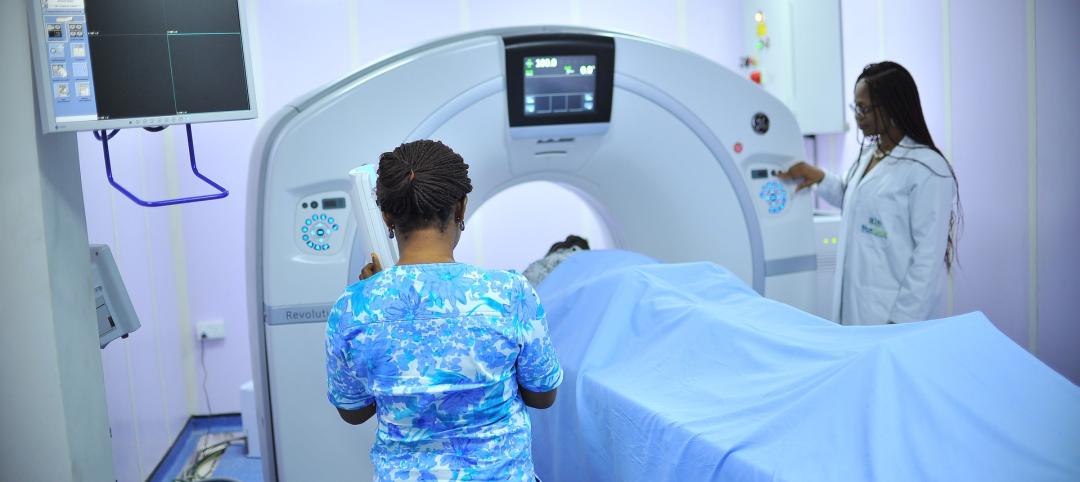To the unndoctrinated, the construction industry conjures images of hard hats and ditch digging. In my years of experience speaking with teachers, students, and up-and-coming generations of workers, time and time again they are surprised to learn that a career in construction can be so much broader and more fulfilling than the stereotypes associated with the trade.
While the industry has made great strides to move beyond a stereotypical view of careers in construction, there is still work to be done to attract, and more importantly, retain, talented workers. Younger generations aren’t just interested in a job, they are seeking career opportunities. They desire to grow, engage meaningfully in their work, and be passionate about what they’re doing. They also want to have a say and be heard.
Flipping Construction Mentoring on Its Head
There’s a unique opportunity for the construction industry to leverage reverse mentorship to retain workers and prepare them for leadership roles while challenging the thoughts and actions of current leaders to improve the culture and operations now and in the future.
Everyone’s familiar with mentorship, where a more senior-level staffer imparts his or her years of wisdom, experience, and council to a younger colleague. Reverse mentorship recognizes that the younger generation has something to offer, too. The added benefit of reverse mentorship is helping seasoned professionals develop new skills, stay connected with younger generations, and gain future-forward insights for life and business.
Relationships between senior and young professionals can be an eye opener for both parties with some crucial benefits supporting today’s business challenges.
Expanding awareness of operations and opportunities. We’ve all heard the saying ‘you don’t know what you don’t know.’ All too often, there’s an information gap between junior and senior staffers, with the junior staff only getting a limited view of the business or projects and senior staffers not fully understanding the breadth of talent on the bench.
Reverse mentoring relationships help connect the dots between junior staffer’s skills and interests and opportunities that they may not have even realized existed in construction. When they know about the possibilities, they can begin to take control and be purposeful in driving their career toward the achievement of a specific goal.
Taking the time to learn more about what young team members are capable of and have interest in, allows senior leaders to identify areas of interest and tailor learning opportunities accordingly. Exposing junior staffers to more prepares them to tap into, and eventually step into, a host of roles. This can be an important part of succession planning.
Room for Diverse Perspectives. Reverse mentoring creates space for diverse perspectives to be heard. Women are the most underrepresented members of the construction workforce. And attracting more women to the construction industry has been a long-standing struggle. The intimate nature of a mentoring relationship makes it possible to dig a little deeper to draw out fresh perspectives and help minority members of the company feel valued and heard.
Creating new pathways to problem solving. As more diverse workers come into the construction industry, with them comes new and valuable perspectives and ways of thinking. It’s crucial to draw those perspectives out and give them space to grow.
Reverse mentoring exposes senior professionals to fresh thinking about the future. Inevitably, we enter ruts and get stuck. We do what we know and what’s comfortable rather than challenge assumptions. Companies that want to improve will seek input from fresh sources: young, old, male, female. No idea is a bad one. Make every meeting and conference room a safe place to elevate new thinking.
This way of approaching problems has served Compass Datacenters well, resulting in major changes that were hard to implement at the outset but serve customers well in the long run.
Advice for implementing reverse mentorship in construction
Start Small. One of the biggest pieces of advice for mentoring of any kind is to know your limits and don’t overcommit. Each season will have a different set of priorities and time restrictions. Be realistic about your schedule and how much time you have available to dedicate to your new relationship. If you don’t have the capacity to commit to attending evening seminars or professional events, consider an in-person lunch or coffee that aligns with your work schedule.
Find the right match for you. It’s important to connect with someone who shares your professional passions; these could be hard or soft skills. Finding the right match for reverse mentorship is all about growing a relationship with someone you respect and connect with. The best mentorship relationships aren’t necessarily between those within the same segment of the industry either. Learning about other areas helps both parties better understand the bigger picture and how each area is connected.
Be authentic and ready to learn. The most important component of reverse mentorship is the relationship itself. In a recent Breaking Glass podcast (a production of Compass Datacenters), I spoke with a colleague about the importance of building your personal board of directors—a group of professionals you can turn to for advice and counsel. In many ways, reverse mentorship is an opportunity to build your board and get well rounded input from colleagues.
The construction industry benefits from relationships and communication. What makes reverse mentorship truly successful is 1) a willingness to be authentic, 2) the act of sharing why you love what you do, and 3) staying interested in hearing other people’s stories.
As the industry continues to grow, it’s critical to prioritize relationships and continuous learning. The best way to prepare for the future of the construction industry is to build relationships with and learn from the next generation.
ABOUT THE AUTHORS
With more than 30 years of experience in the construction industry, Nancy Novak brings extensive expertise in oversight and responsibility for Profit and Loss. In her current role as Chief Innovation Officer for Compass Datacenters, her focus is cutting edge technology, lean practices, and innovative culture through diversity of thought to add value, improve return on investment, and disrupt the construction industry. Nancy serves on the Board of Directors for Weston Solutions, a global environmental firm. She is heavily involved in organizations that lead the way for technological advancement in the construction industry, and she is an advocate for women’s leadership. Nancy currently serves as the Board of Director Vice Chair on the National Institute of Building Sciences BIM Council, as well as Executive Sponsor for the Digital Divide on the iMasons Advisory Board. She is also the host of the “Breaking Glass” podcast, which features Nancy’s dynamic conversations with prominent women in the technology industry—a forum where these accomplished women offer insights, advice and inspiration that listeners can apply to their own professional lives.
Tiffany English is Senior Director, Architecture for Qualcomm Incorporated. Qualcomm is the world’s leading technology innovator. With Real Estate Assets over 12 Million square feet in 30 countries and 40,000+ employees globally. Qualcomm’s breakthroughs in 5G are making the world more connected while making an impact on society and world’s biggest challenges. Tiffany’s role at Qualcomm is oversight of the companies architectural, interior design, space planning, facilities planning, lab planning and MEP engineering teams globally. Tiffany has more than 24 years of industry experience and has overseen, designed, and managed over 7 million square feet of projects for commercial real estate and Fortune 500 clients. Tiffany is currently serving as Immediate Past President of CREW Network, 2021. CREW Network represents 75+ markets and over 12,000 members globally. CREW Network continues to transform the commercial real estate industry by advancing women globally.
Related Stories
Geothermal Technology | Jul 29, 2024
Rochester, Minn., plans extensive geothermal network
The city of Rochester, Minn., home of the famed Mayo Clinic, is going big on geothermal networks. The city is constructing Thermal Energy Networks (TENs) that consist of ambient pipe loops connecting multiple buildings and delivering thermal heating and cooling energy via water-source heat pumps.
High-rise Construction | Jul 29, 2024
Safdie Architects’ Shanghai office tower features glass-enclosed corner garden that ascends the 35-story structure
Safdie Architects has announced the completion of LuOne Mixed-Use Complex—a business, retail, and entertainment development in the Luwan district of Shanghai, China. The mixed-use complex consists of an eight-level retail galleria, which opened in 2018, and a 35-story office tower, which recently reached completion.
Casinos | Jul 26, 2024
New luxury resort casino will be regional draw for Shreveport, Louisiana area
Live! Casino & Hotel Louisiana, the first land-based casino in the Shreveport-Bossier market, recently topped off. The $270+ project will serve as a regional destination for world-class gaming, dining, entertainment, and hotel amenities.
Smart Buildings | Jul 25, 2024
A Swiss startup devises an intelligent photovoltaic façade that tracks and moves with the sun
Zurich Soft Robotics says Solskin can reduce building energy consumption by up to 80% while producing up to 40% more electricity than comparable façade systems.
Codes and Standards | Jul 25, 2024
GSA and DOE select technologies to evaluate for commercial building decarbonization
The General Services Administration and the U.S. Department of Energy have selected 17 innovative building technologies to evaluate in real-world settings throughout GSA’s real estate portfolio.
Great Solutions | Jul 23, 2024
41 Great Solutions for architects, engineers, and contractors
AI ChatBots, ambient computing, floating MRIs, low-carbon cement, sunshine on demand, next-generation top-down construction. These and 35 other innovations make up our 2024 Great Solutions Report, which highlights fresh ideas and innovations from leading architecture, engineering, and construction firms.
MFPRO+ News | Jul 22, 2024
Miami luxury condominium tower will have more than 50,000 sf of amenities
Continuum Club & Residences, a new 32-story luxury condominium tower in the coveted North Bay Village of Miami will feature more than 50,000 sf of indoor and outdoor amenities. The program includes a waterfront restaurant, dining terraces with resident privileges, and a private dining room outdoor pavilion.
Healthcare Facilities | Jul 22, 2024
5 healthcare building sector trends for 2024-2025
Interactive patient care systems and trauma-informed design are among two emerging trends in the U.S. healthcare building sector, according to BD+C's 2024 Healthcare Annual Report (free download; short registration required).
Office Buildings | Jul 22, 2024
U.S. commercial foreclosures increased 48% in June from last year
The commercial building sector continues to be under financial pressure as foreclosures nationwide increased 48% in June compared to June 2023, according to ATTOM, a real estate data analysis firm.
Codes and Standards | Jul 22, 2024
Tennessee developers can now hire their own building safety inspectors
A new law in Tennessee allows developers to hire their own building inspectors to check for environmental, safety, and construction violations. The law is intended to streamline the building process, particularly in rapidly growing communities.

















